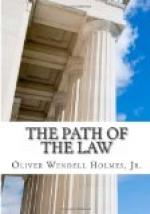I have been speaking about the study of the law, and I have said next to nothing about what commonly is talked about in that connection—text-books and the case system, and all the machinery with which a student comes most immediately in contact. Nor shall I say anything about them. Theory is my subject, not practical details. The modes of teaching have been improved since my time, no doubt, but ability and industry will master the raw material with any mode. Theory is the most important part of the dogma of the law, as the architect is the most important man who takes part in the building of a house. The most important improvements of the last twenty-five years are improvements in theory. It is not to be feared as unpractical, for, to the competent, it simply means going to the bottom of the subject. For the incompetent, it sometimes is true, as has been said, that an interest in general ideas means an absence of particular knowledge. I remember in army days reading of a youth who, being examined for the lowest grade and being asked a question about squadron drill, answered that he never had considered the evolutions of less than ten thousand men. But the weak and foolish must be left to their folly. The danger is that the able and practical minded should look with indifference or distrust upon ideas the connection of which with their business is remote. I heard a story, the other day, of a man who had a valet to whom he paid high wages, subject to deduction for faults. One of his deductions was, “For lack of imagination, five dollars.” The lack is not confined to valets. The object of ambition, power, generally presents itself nowadays in the form of money alone. Money is the most immediate form, and is a proper object of desire. “The fortune,” said Rachel, “is the measure of intelligence.” That is a good text to waken people out of a fool’s paradise. But, as Hegel says, “It is in the end not the appetite, but the opinion, which has to be satisfied.” To an imagination of any scope the most far-reaching form of power is not money, it is the command of ideas. If you want great examples, read Mr. Leslie Stephen’s History of English Thought in the Eighteenth Century, and see how a hundred years after his death the abstract speculations of Descartes had become a practical force controlling the conduct of men. Read the works of the great German jurists, and see how much more the world is governed today by Kant than by Bonaparte. We cannot all be Descartes or Kant, but we all want happiness.




